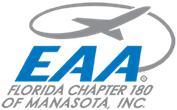Click here to download the EAA180 Young Eagles Schedule through May 2025

It’s the only program of its kind, with the sole mission to introduce and inspire kids in the world of aviation.
As of today, the Young Eagles program has flown over 2 million kids.
Young Eagles flights are held near the Sarasota/Bradenton International Airport. Before taking a flight, each Young Eagle is taught about what makes an airplane fly, the importance of always keeping an eye on the weather and safety procedures within the airplane. The Young Eagles are taught by the EAA180 volunteer pilot of the airplane about how and why to inspect an aircraft for airworthiness before each flight. And the pilot always tries to relate to the kids on their age level.
Next the crew loads into the aircraft; watching and listening to how the pilot speaks with the air traffic controllers in the tower to learn which taxiways and runway they should take for their flight. Each plane takes flight so that the Young Eagles can see what the birds see every day when they fly around. Then it is back to the airfield for landing and presentation of their newly earned personal Young Eagle certificate (always exciting!).
There are 4 steps:
- On the ground: Your pilot explains what will happen during the flight. You may talk about the airplane, review an aeronautical chart (or map), and complete a careful “walk-around” preflight inspection of the airplane.
- Just before takeoff: Your pilot explains the interior of the airplane, including the operation of the aircraft door, safety belts, and instrument panel.
- In the air: The flight lasts between 15 and 20 minutes. And, if you want, your pilot may let you take the controls!
- Back on the ground: There’s more time for you to ask questions about the flight. Your pilot is happy to tell you more about flying and their particular airplane.
For more information from EAA headquarters about the Young Eagles program, visit www.youngeagles.org
Click here to download the EAA180 Young Eagles Schedule through May 2025

